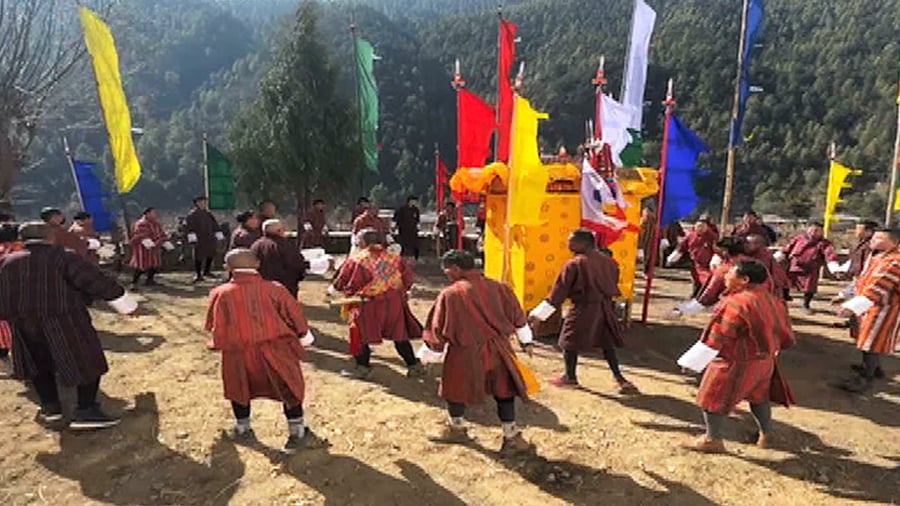
Haa plans to document the Bonko festival, a celebration that takes place every three years in the district. The local event is dedicated to appeasing deities for peace and prosperity while commemorating the victory over evil in Tsaphel of Uesu Gewog. After a six-year hiatus due to the COVID-19 pandemic, the festival resumed on Wednesday. Despite its successful return, the district faces challenges of fewer people taking an interest in learning the traditional art and declining participation due to youths seeking better opportunities abroad.
In their finest attire, the Pazaps or soldiers symbolising the conquest of evil, bad luck, and calamities engage in a ritual.
Chanting, nine hours, nine days, and nine years and nine lifetimes, they declare that evil spirits and misfortune will not dare visit their community.
An elderly person shoots an arrow away from the village symbolising warding off evil to the furthest extent. They repeat the ritual in all four directions.
“As the host, we have to release an arrow pointing away from the village symbolising the defeat of all invisible enemies. Then we gather in the ground to sing a ballet of victory locally called Zhey, which is followed by the Shamans performing a divination ritual. Then all the Pazaps are conferred white scarves to commemorate success. Finally, we see off the Shaman, which marks the end of the Bonko,” said Nima Gyeltshen, a resident of Tsaphel.
“It is a tradition our forefathers practised, and we have preserved it although our parents did not tell us what the festival meant. It is like a cleansing ceremony, which is primarily to appease the local deities for peace and prosperity in the community,” said Gyem Dorji, a resident of Kana.
“If we do not perform the ritual on time, it will bring disharmony in the community, and we will not have timely rainfall and bountiful harvests,” said Lhab Tshering, another resident of Kana.
Every man, including adolescents, participates in the parade.
With many young Haaps seeking opportunities abroad for better livelihood and education, there is a growing gap between the elderly and the upcoming generation, causing concerns among the villagers about preserving the tradition.
“We have not faced significant challenges in terms of participation. However, with many leaving to study abroad, the participation rate has declined. For instance, in the past, we used to have 80 Pazaps but this year, the turnout has reduced to 60,” said Nima Tshering, a resident of Tsaphel.
“Pazaps have a crucial role in our tradition. They prepare for the main event of warding off evil where every Pazap must be present. During the Zhey, there are 13 different Zheys and we take turns singing them,” said Yeshi Dhendup, another resident of Tsaphel.
“Currently, we are facing challenges in activities like archery due to a shortage of players. Similarly, participation in other festivals is also decreasing. While we have new and young participants in events like the Bonko, we are starting from scratch by teaching them the tradition,” said Ugyen Tenzin, also a resident of Tsaphel.
“In the past, we had 13 different Zhey performances during the Bonko. Over time, many elders who knew all the verses have passed away and unfortunately, we did not learn from them. Now, we only know a few verses that we can pass on,” said Lhabchu, a resident.
“Some of our elders have passed away and many young people our age left for other countries. Those of who remain are doing their best to learn and preserve our culture. We believe we can do a good job of preserving and promoting our tradition,” said Dawa Penjor, a resident of Tsaphel.
“The Bonko festival falls during our vacation, so we have the chance to take part and we are eager to do so. We follow whatever the seniors instruct us to do. This year, I got the opportunity to join the seniors in welcoming the Shaman from the main altar to other events. It is a new experience for me, as in previous years, we were considered too young for this role,” said Phub Dorji, a resident of Tshaphel.
The district culture officer said there are no written documents about the Bonko festival for reference. The office plans to document the festival, capturing every detail both in writing and visually.
Bonko festival is also celebrated in Bji and Kar-Tshog Gewogs in Haa.
Namgay Wangchuk, Haa
Edited by Sonam Pem & Kipchu






